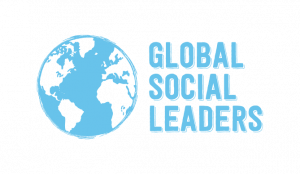We are delighted to share a blog written by students Rachel and Lucy from Cheltenham Ladies’ College, who are part of a team delivering a Global Goals project for the 2019-20 Global Goals Competition.
Their project is among over 957 social action projects currently running as part of the GSL movement and we are excited to be supporting them to design and lead positive social change in their community.
Working together so that all children in Cheltenham thrive.
Project Overview
Our project was divided into two aspects: raising awareness of the No Child Left Behind Campaign and assisting families with essential food and hygiene items. The campaign, which was run last year, brought attention to the number of children living in poverty in Gloucestershire. It is predicted that there is a region of 4,300 children and young people growing up in poverty, and these children are at greater risk at suffering challenges such as being victims of crime, poorer education, higher rates of exclusion, and higher risks of being open to social care, to name a few. After seeing Ms Charlotte Blanch, the headmistress of Saint Gregory’s Primary School on a BBC documentary, ‘Inside Out West’, where she spoke about the challenges of having a low income in what is perceived to be a rich town, like Cheltenham. We really wanted to work with Ms Blanch after watching the documentary because her own initiative was a key factor in addressing the social problems in our community.
We centred our project around Saint Gregory’s, which we felt was a hub of our very immediate community and so where we could make the biggest impact. Ms Blanch mentioned how she had in place a process of food collection for families within the school who were in need of extra food supplies and hygiene products. Ms Blanch explained to us that often families on low incomes will miss these items off their shopping list as a way to limit their weekly bills. Also, the value of making someone feel better about themselves by simply feeling clean in times of financial struggle. From then on, we wrote to many supermarkets, food stores and cafés asking them whether they would be able to donate their food items which they have leftover from the end of a business day. Chaplais Kitchen very generously agreed to help us and was happy also to be reducing their food waste, which was often inhibited by Health and Safety regulations.
Our team name, Footprints’ is in recognition of the food parcel deliveries we ran which the benefactors could anonymously collected from the school. The most important aspect of this process was the anonymity of collecting the food parcels. We feel that we were able to reach a wider audience of families who needed this service, since there was no shame in anonymously collecting these food parcels, in contrast, to actively attending a Food Bank. By the end of our project, we had delivered a mix of 69 sandwiches and baguettes, and 102 pastries and pasties by our 16 volunteers who collected the foods during the evening, and delivered them during their lunch breaks. Our project was unfortunately inhibited by some Health and Safety regulations, over concerns of the delivery and storage of the food and so this aspect was brought to a close after 6 weeks. However, despite this setback, we have developed a new connection with a local school, where we are looking to continue our link in the future in other ways.
We decided to raise awareness of the campaign by running various sales around College, where we sold handmade jewellery made out of dried resin, and also cakes. This was to fund our goal to provide 35 Easter eggs to children at Saint Gregory’s who were not necessarily going to receive an Easter egg. Our intentions were to create some happiness for these children and for them to feel integrated within their peer group and the community. In this experience, we learnt how to run a book of payments, and how best to advertise our goods. Our customers found it really cool how their money was going directly to buying these Easter eggs for the children!
In total, we raised £172 which left us with some remaining funds with which we bought washing powders and tablets. We delivered the Easter eggs and washing products to Saint Gregory’s on Thursday 19th March, in time for the closing of schools the following day! We hoped that this timing meant that these families were prepared for the isolation ahead in the following weeks.
Our Journey
We have developed evaluative and practical thinking skills as a result of planning our project. When we were attempting to organise the food deliveries, we considered the possibility of buying discounted goods using donations or contacting stores for help. After trials, we recognised that depending on money donations was not sustainable and that we need to focus on contacting local coffee shops, rather than big supermarkets such as Waitrose and Tesco, which were already in cooperation with similar charity organisations.
We also developed communication skills in the process. We realised how passion can move people to understand the needs of others and become willing to help. We also learned that formalities were essential in forming an impression. When going around the boarding houses for fundraising, we communicated smoothly and raised a significant amount of money successfully.
Surprisingly, we also learned not to judge by appearances and perseverance. The coffee shop, Chaplais Kitchen, that ended up helping us, looked quite posh from the outside. Being one of the last coffee shops that we were visiting, we considered giving up, believing that they would not help us. However, they were warm and helpful, cleaning out the whole counter for us at the end of the day.
The acknowledgement of underprivileged areas in a wealthy town like Cheltenham was shocking to us first, but then it led us to the realisation of the significance of economic inequality. We were deeply touched by the extent of our privileges and became willing and confident to make a contribution to the world.
Our biggest challenge was learning the importance of organisation and cooperation. During the project, some arguments were raised on the subject of our responsibilities and titles in the group. After some long discussions and the empathy of everyone, we established the principle that empathy is essential in collaborations and we are meant to cooperate and care for each other. We managed to resolve our conflict and work as a single organism, which greatly helped us in the following bake sales and fundraising events.
The Next Chapter
We would highly recommend our peers to get involved in similar projects. The joy of knowing that you made others’ lives better is blissful and refreshing. Through the competition, or rather simply a project, you will not only learn teamwork but realise the privileges we enjoy unknowingly and be filled with confidence ready to change the world for the better. In a world gradually filled with ignorance and arrogance, empathy is becoming a gift to everyone around us.
Yes, the profound reforms the society needs to tackle challenges may only be achieved through political battles, but every bit of kindness counts. Only when one flower of smile flourishes can there be thousands stretching out to the end of our horizons.
The 2019-20 GSL Global Goals Competition is now open and runs until June 2020. If you belong to one of the 700+ teams of students currently delivering a social action project as part of the competition we would love to hear from you and feature your blog and project photos on our website to inspire others.









